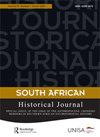一个不情愿的叛乱者:约翰·姆斯金亚和阿利瓦尔北部的分裂
IF 1
3区 历史学
Q1 HISTORY
引用次数: 0
摘要
本文追溯了1908年约翰·姆西金亚脱离原始卫理公会的历程。Msikinya作为其首批非洲牧师之一受到了教会的款待,并于1899年访问了英国,为Aliwal North教堂的发展筹集资金。由于被拒绝进一步晋升,特别是在英国牧师的监督下领导他的会众,姆西金亚与欧洲牧师和世俗教会领袖的关系恶化。他被驱逐了,带走了会众中的重要一部分。Msikinya建立了自己的教会,南非原住民长老会,并在20世纪20年代仍活跃在Aliwal North。分离对原始卫理公会在南非的传教工作产生了令人沮丧的影响。姆西金亚的经历在1880-1910年间其他非洲部长的职业生涯中很熟悉。Msikinya案件的特点是他坚持不懈地寻求保持原始卫理公会教徒的身份,并努力利用教会的程序来支持他的案件。在姆西金亚所属的欧洲化非洲精英受到越来越大的限制的背景下,他的分离表明教会无法将领导权移交给当地社区。本文章由计算机程序翻译,如有差异,请以英文原文为准。
A Reluctant Rebel: John Msikinya and Secession at Aliwal North
ABSTRACT This article traces the course of the secession of John Msikinya from the Primitive Methodist Church in 1908. Msikinya was feted by the church as one of its first African ministers and toured the UK in 1899 to raise funds for the development of the church in Aliwal North. Denied further advancement, in particular leadership of his congregation unsupervised by English ministers, Msikinya’s relationship with European ministers and lay church leaders deteriorated. He was expelled, taking with him a significant part of his congregation. Msikinya established his own church, the Native Presbyterian Church of South Africa, and was still active in Aliwal North in the 1920s. The secession had a dispiriting effect on the Primitive Methodists’ missionary work in South Africa. Msikinya’s experience is familiar from the careers of other African ministers in the period 1880–1910. Msikinya’s case is distinguished by the tenacity with which he sought to remain a Primitive Methodist and his efforts to use the church’s procedures to bolster his case. Against a background of growing constraints on the Europeanised African elite to which Msikinya belonged, his secession demonstrated the inability of the missionary church to devolve leadership to the local community.
求助全文
通过发布文献求助,成功后即可免费获取论文全文。
去求助
来源期刊

South African Historical Journal
Multiple-
CiteScore
0.70
自引率
0.00%
发文量
37
期刊介绍:
Over the past 40 years, the South African Historical Journal has become renowned and internationally regarded as a premier history journal published in South Africa, promoting significant historical scholarship on the country as well as the southern African region. The journal, which is linked to the Southern African Historical Society, has provided a high-quality medium for original thinking about South African history and has thus shaped - and continues to contribute towards defining - the historiography of the region.
 求助内容:
求助内容: 应助结果提醒方式:
应助结果提醒方式:


